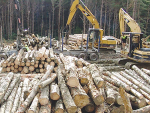Canada's blatant manipulation of international trade rules around the export of subsidised dairy products is likely to escalate further with the new Trump administration now in the White House.
Just a week ago the Dairy Companies Association of NZ (DCANZ) joined forces with similar organisations in the US and Australia in writing to their respective agriculture ministers over Canada's dumping of subsidised dairy products on the world market. The move is distorting the market and affecting dairy farmers' returns in other dairy exporting countries such as NZ.
NZ's Agriculture Minister Todd McClay says his government shares their concerns and says he's previously raised objections with Canada. He says he's now instructed his trade officials to engage with their counterparts in Australia and the USA on Canada's practices and asked for an assessment of any harm that is being caused in international markets.
"We will be exploring what action we might take jointly, in particular with the new administration in the US, against harmful Canadian dairy trade practices," he told Rural News.
This issue, according to DCANZ executive director Kimberly Crewther, is different and bigger than the other beef NZ has with Canada which is blocking NZ exports to Canada under and existing agreement through the Comprehensive and Progressive Agreement for Trans-Pacific Partnership (CPTPP). Under CPTPP rules, Canada is required to give NZ access to its market and despite NZ winning a mediation dispute to have access, Canada blatantly refused to budge. This dispute has been going on for almost two years and has been the subject of several mediations, all of which have been won by NZ but which Canada has refused to comply with.
McClay says NZ will continue to peruse legal action under the CPTPP and, with the impending change of prime minister in Canada, will take the opportunity to urge the new administration to address our concerns and stop these harmful dairy practices.
The Issue
At the heart of this latest action by Canada is the lengths their government is going to curry favour with their lifestyle-like domestic dairy industry – average herd size a mere 89 cows. And it’s not the first time the Canadians have done this, effectively dumping heavily subsidised milk powder on the international market to the detriment of unsubsidised NZ producers.
According to DCANZ’s Kimberly Crewther, what the Canadian Dairy Commission, a government enacted organisation, is doing is setting up an internal system that manipulates the price downwards so that dairy producing companies can buy milk from farmers at cut prices, enabling them to undercut other international exporters.
“The price that the processors can buy the milk from farmers is roughly half the cost of producing that milk. This means that Canadian milk products that would otherwise be uncompetitive are out there competing against us,” she says.
New US president Donald Trump has signalled that he will apply tariffs on Canada. But aside of that rhetoric, there lurks an agreement called the ‘United States- Mexico-Canada Agreement (USMCA)’ – effectively a free trade agreement between the three countries – which is coming up for renegotiation. Previously this agreement had a clause preventing this sort of action by Canada, but to get around this, the Canadians simply changed the type of milk in the agreement from class 7 to class A4 and went back to its policy of subsidies again.
It’s possible that the present row involving the US, Australia and NZ could become part of this process as well.



















